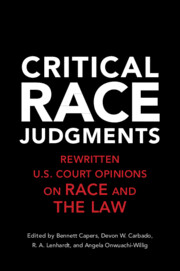Book contents
- Critical Race Judgments
- Critical Race Judgments
- Copyright page
- Contents
- About the Contributors
- Advisory Committee
- Foreword
- Introduction
- 347 U.S. 483 (1954)BROWN et al.
- Part I Membership and Inclusion
- Part II Participation and Access
- 509 U.S. 630Supreme Court of the United States
- 528 U.S. 495Supreme Court of the United States
- 418 U.S. 717Supreme Court of the United States
- 275 U.S. 78Supreme Court of the United States
- Supreme Court of the United States
- 551 U.S. 701Supreme Court of the United States
- 477 U.S. 57 (1986)
- Part III Property and Space
- Part IV Intimate Choice and Autonomy
- Part V Justice
477 U.S. 57 (1986)
MERITOR SAVINGS BANK, FSB, Petitionerv.Mechelle VINSON et al.No. 84-1979.
from Part II - Participation and Access
Published online by Cambridge University Press: 22 April 2022
- Critical Race Judgments
- Critical Race Judgments
- Copyright page
- Contents
- About the Contributors
- Advisory Committee
- Foreword
- Introduction
- 347 U.S. 483 (1954)BROWN et al.
- Part I Membership and Inclusion
- Part II Participation and Access
- 509 U.S. 630Supreme Court of the United States
- 528 U.S. 495Supreme Court of the United States
- 418 U.S. 717Supreme Court of the United States
- 275 U.S. 78Supreme Court of the United States
- Supreme Court of the United States
- 551 U.S. 701Supreme Court of the United States
- 477 U.S. 57 (1986)
- Part III Property and Space
- Part IV Intimate Choice and Autonomy
- Part V Justice
Summary
Argued March 25, 1986. Decided June 19, 1986.
Justice Angela ONWUACHI-WILLIG delivered the opinion of the Court.1
This case presents important questions concerning claims of workplace “sexual harassment” brought under Title VII of the Civil Rights Act of 1964, 78 Stat. 253, as amended, 42 U.S.C. § 2000e et seq. These questions include (1) whether the factual record was sufficiently developed to render decisions on either a quid pro quo claim or a hostile environment claim; (2) whether sexual harassment leading only to psychological harm violates Title VII; (3) whether the “voluntariness” of the complainant’s participation in sexual activity is pertinent in a hostile environment case, (4) whether the complainant’s manner of dress or sexually provocative speech is relevant to determining whether sexual harassment occurred; (5) whether the trial court erred in excluding testimonial evidence from other women who claimed to have been harassed by the alleged wrongdoer and to have seen him harass the complainant; and (6) whether employers are automatically liable for sexual harassment by their supervisory personnel regardless of notice to the employer.
- Type
- Chapter
- Information
- Critical Race JudgmentsRewritten U.S. Court Opinions on Race and the Law, pp. 286 - 302Publisher: Cambridge University PressPrint publication year: 2022

